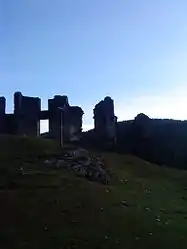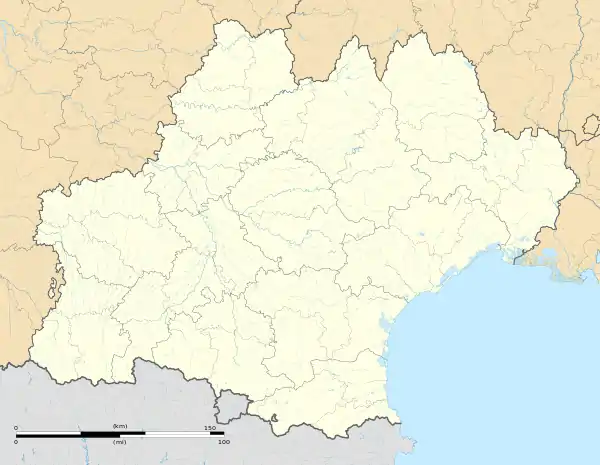Saint-Julien-d'Arpaon | |
|---|---|
Part of Cans-et-Cévennes | |
 The ruins of the château in Saint-Julien-d'Arpaon | |
Location of Saint-Julien-d'Arpaon | |
 Saint-Julien-d'Arpaon  Saint-Julien-d'Arpaon | |
| Coordinates: 44°18′01″N 3°39′59″E / 44.3003°N 3.6664°E | |
| Country | France |
| Region | Occitania |
| Department | Lozère |
| Arrondissement | Florac |
| Canton | Le Collet-de-Dèze |
| Commune | Cans-et-Cévennes |
| Area 1 | 20.72 km2 (8.00 sq mi) |
| Population (2019)[1] | 93 |
| • Density | 4.5/km2 (12/sq mi) |
| Time zone | UTC+01:00 (CET) |
| • Summer (DST) | UTC+02:00 (CEST) |
| Postal code | 48400 |
| Elevation | 580–1,421 m (1,903–4,662 ft) (avg. 610 m or 2,000 ft) |
| 1 French Land Register data, which excludes lakes, ponds, glaciers > 1 km2 (0.386 sq mi or 247 acres) and river estuaries. | |
Saint-Julien-d'Arpaon (French pronunciation: [sɛ̃ ʒyljɛ̃ daʁpaɔ̃]; Occitan: Sent Julian d'Arpaon) is a former commune in the Lozère department in southern France.[2] On 1 January 2016, it was merged into the new commune of Cans-et-Cévennes.[3] Its population was 93 in 2019.[1]
Saint-Julien-d'Arpaon stands at a crossing of the river Mimente on the Robert Louis Stevenson Trail (GR 70), a popular long-distance path following approximately the route travelled by Robert Louis Stevenson in 1878 and described in his book Travels with a Donkey in the Cévennes.[4] Stevenson mentions the village and its ruined chateau in passing, though not by name:
...the road passed hard by two black hamlets, one with an old castle atop to please the heart of the tourist.[5]
See also
References
- 1 2 Téléchargement du fichier d'ensemble des populations légales en 2019, INSEE
- ↑ Des villages de Cassini aux communes d'aujourd'hui: Commune data sheet Saint-Julien-d'Arpaon, EHESS (in French).
- ↑ Arrêté préfectoral 2–14 December 2015
- ↑ Castle, Alan (2007). The Robert Louis Stevenson Trail (2nd ed.). Cicerone. pp. 129–127. ISBN 978-1-85284-511-7.
- ↑ Stevenson, Robert Louis (1905) [1879]. . Travels with a Donkey in the Cevennes. New York: Charles Scribner's Sons. p. – via Wikisource.